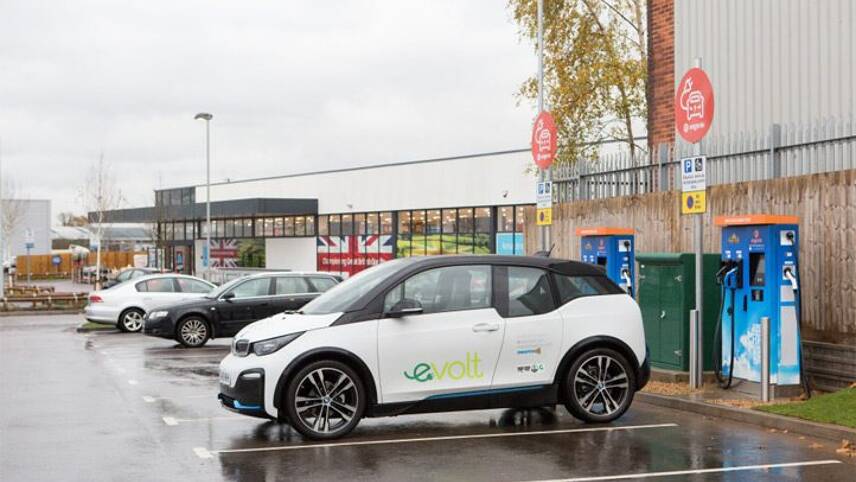Register for free and continue reading
Join our growing army of changemakers and get unlimited access to our premium content

Image: Greenhouse PR
The firm has partnered with Engenie to install the chargers, which will be powered by 100% renewable electricity and will be capable of adding 160 miles of range to the average pure EV within 73 minutes – the average duration of a British shopping trip. The chargers are compatible with all fully electric and hybrid-electric cars currently on the UK market.
Brookhouse Group has today (23 June) opened the first 13 of the chargers, spread out across seven of its retail parks. Meteor Shopping Park, Bournemouth; Canal Road, Bradford; Manchester Road Shopping Park, Stockport; Queens Shopping Park, Preston; Parsonage Retail Park, Leigh; Barnfield Retail Park, Chichester and Alexandra Retail Park, Oldham, are now all host to at least one charging point
A further four charging points will be installed across North Quay Retail Park, Lowestoft; Cables Shopping Park, Prescot and Hamilton Shopping Park, Hamilton, by the end of December.
Each of these locations is home to several major retailers, with customers visiting Argos, Marks & Spencer, Aldi and Sainsbury’s among those set to benefit. Visitors will not need a membership to use the chargepoints; they will simply be able to pay-as-you-go.
Engenie estimates that, during the lifetime of the charging points, more than 20,000 tonnes of carbon emissions and 16 tonnes of nitrous oxides (NOx) will be mitigated, in comparison to shoppers bringing petrol vehicles. These figures were calculated using Brookhouse Group’s visitor figures for 2019, when around 18 million vehicles visited one of its locations.
The announcement comes shortly after “non-essential” retailers were given the green light to reopen in England, after closing on 23 March in line with coronavirus lockdown restrictions. There are concerns about what the lockdown will mean for retailers, with speculations that locations will either face overwhelm or reduced footfall, and what the broader pandemic could mean for EV adoption.
But Brookhouse Group’s property director Mike Nuttall said he was experiencing increased demand for EV charging infrastructure from businesses located at its retail parks and its visitors alike pre-pandemic, and expects this to continue going forward.
“The way we travel is changing like never before and already we are seeing a wholesale shift towards electric mobility,” Nuttall said. “Customers will expect to be able to charge their vehicles wherever they shop, and our tenants will expect us to provide the infrastructure which enables them to do so.”
The road ahead
The announcement from Brookhouse Group comes after Engenie unveiled plans to install 2,000 rapid EV chargers in the UK by 2024. As of July 2019, the UK played host to around 2,200 public EV charging points, meaning that the delivery of Engenie’s vision would ultimately result in a doubling of the national chargepoint stock.
Other businesses working with Engenie include M7 Real Estate and pub and brewing giant Marston’s – the latter of which is aiming to host 400 chargers across its UK-wide estate.
UK businesses and policymakers have faced repeated warnings that the scale of EV adoption has far outpaced the introduction of charging infrastructure in recent times. PwC, for example, has claimed that UK’s EV stock reached 134,000 vehicles in 2017 – a 54% increase on 2016 figures – but that there are only 13,500 charging points to support these vehicles.
In response, businesses including Lidl, Morrisons, Tesco and Mitchells & Butlers have increased investments in EV charging points for customers. Chancellor Rishi Sunak, meanwhile, earmarked £500m for fast-charging networks for EVs in the 2020 budget. His party’s ambition on EV infrastructure is for no driver to ever be more than 30 miles away from a publicly accessible chargepoint.
After concerns around supply chain impact, lower investment and the logistical challenges of installing EV-related technologies in the early stages of lockdown, the EV sector seems to be rebounding. Pure and hybrid EVs accounted for 17% of all car sales in Europe in April, an increase on both a month-on-month and year-on-year basis, one analysis found. This was despite vehicle sales falling overall, with a far steeper decline recorded for diesel models.
Moreover, many cities and nations look set to include transport electrification as a key part of their Covid-19 recovery packages. Boris Johnson is reportedly positioning projects to extend EV charging networks as a key short-term measure to create jobs and spur decarbonisation. A report backed by his Government and released earlier this week concluded that the EV sector could provide a £24bn boost to the UK economy through to 2025, provided it receives the right support to scale up production.
Sarah George


This is the sort of thing that WILL make EV’s more appealing to the masses. It will also remove much of the range anxiety and make smaller EV’s with their shorter battery range more feasible, mind you who needs more than 50 miles around town really?
To be really effective though they will need to install the charge points at the prime parking spots, that is closest to the main entrances of the centres. Not on the far edge of the car park where is often the case.